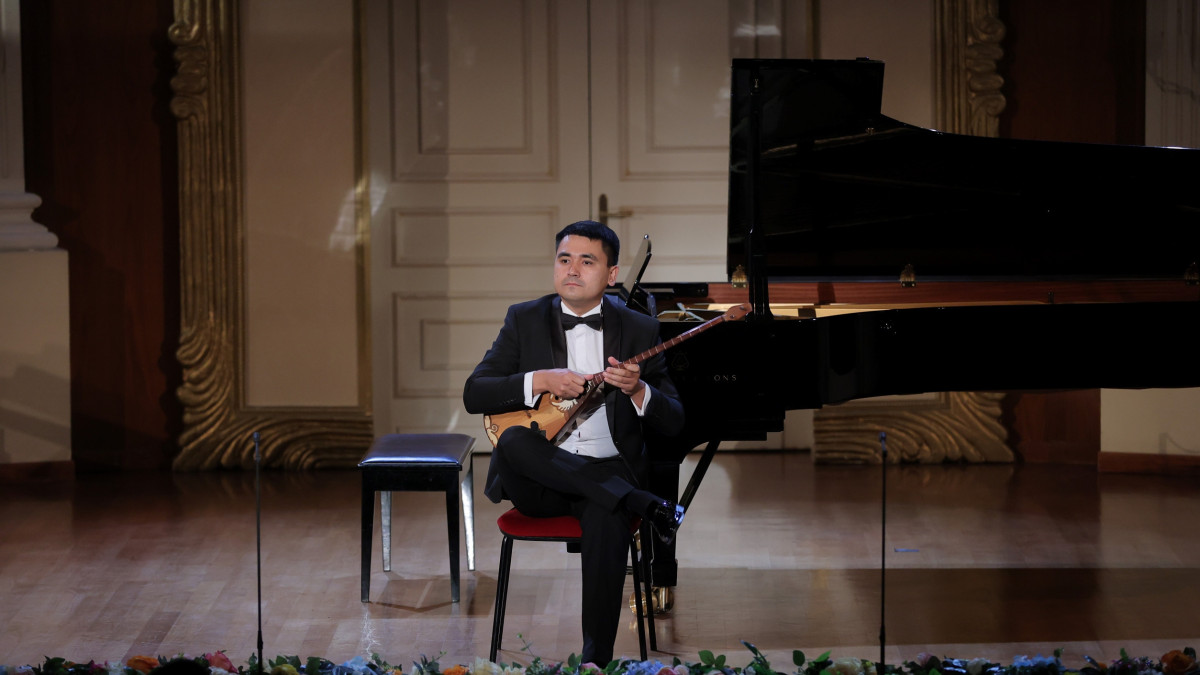
Kazakhstan to celebrate National Dombyra Day.

EL.KZ Информационно-познавательный портал
This year, on July 7, our country will celebrate National Dombyra Day. There are many people at Astana Opera who devote themselves to this national instrument and who popularize it, El.kz cites astanaopera.kz.
In anticipation of this holiday, we spoke with the conductor of the capital’s opera house, holder of the Order of Qurmet, Ruslan Baimurzin, about how he manages to combine the main profession of a conductor with the art of playing the dombyra.
- Maestro Baimurzin, you are well-known in Kazakhstan and abroad as a conductor and dombyra player. Tell us a little more about how you learned to play the dombyra, who introduced you to this instrument.
- In any Kazakh family, the presence of a dombyra is a natural phenomenon. Also, thanks to my father’s skill in playing the dombyra, we have listened to the magical sounds of this instrument since childhood. My father, noticing my passion for music and interest in dombyra, sat me in front of him and taught me to play. I was six years old then. The first person who introduced me to dombyra was my father, and then I was lucky enough to meet wonderful mentors on my creative path. When I enrolled in the children’s music school in Kokshetau, my teacher was Serik Sarsenbayev. Later, at the Akhmet Zhubanov Republican Kazakh Music Boarding School for Gifted Children in Almaty, Professors Aitzhan Toktagan and Gulperizat Ultarakova taught me. I would say that all my achievements in dombyra art became possible thanks to these people.
- At Astana Opera, you conduct many opera and ballet productions, as well symphonic programs, and also often play dombyra in concerts. Is it difficult to combine these two specializations?
- I often perform with the dombyra on our opera house stage, and I also had many opportunities to demonstrate my art of playing the dombyra during our tours abroad. In general, you can often hear the sounds of this instrument at concerts and opera performances at Astana Opera. This, first and foremost, applies to national opera productions presented in the opera house’s repertoire, such as Akhmet Zhubanov and Latif Khamidi’s Abai, Yevgeniy Brussilovsky’s Qyz Zhibek, Mukan Tulebayev’s Birzhan – Sara, Yerkegali Rakhmadiyev’s Alpamys, where artists perform famous works with dombyra.
Certainly, I cannot say that combining two professions is easy, since conducting and solo performance are two different worlds. When you play the dombyra, you feel as if you are talking only with the dombyra, while conducting is working with people, leading them, it is a completely different matter. However, both professions are close to me. Conducting affects playing the dombyra, and vice versa. My interest in conducting awoke when I was in high school at a music school in Almaty. It so happened that I enrolled in the conservatory to major in Opera and Symphony Conducting. During my student years, I strived to combine both professions, but had to devote more time to conducting, since this was a new direction for me, a new stage.
Obviously, if a musician does not practice the instrument and frequently rehearse the repertoire, his form will gradually deteriorate. Although I no longer practice day and night, as in my school years, if I spend an hour or two working on it, I quickly get back into shape. At the moment, the basic education that I received in school is stored in my memory for life. After all, in those days I participated in many competitions and gained a lot of experience.
- You conduct both symphony orchestras and folk instruments orchestras. In such cases, does it seem to you that the sound of the dombyra stands out among other instruments?
- The differences between a symphony orchestra and a folk instruments orchestra are tremendous. Their sound, nature, so to speak, even worldviews are different. During the work, when you lead these two orchestras, each needs to be given attention corresponding to its characteristics. However, when I play a dombyra solo with an orchestra, I notice that the sound of the dombyra harmonizes and matches well with both a symphony orchestra and a folk instruments orchestra. In my opinion, this is a special quality of our dombyra.
Another feature of the dombyra is that musicians, be it violinists or pianists, always experience patriotic feelings when they hear its soft sound, because the sound of the dombyra has the ability to awaken in all Kazakhs their national code.
- Do you plan to teach students dombyra playing in the future? What wishes would you express to the people of our country in anticipation of National Dombyra Day?
- I had teaching experience during my student years, but now, to be honest, I do not have enough time to do it. Perhaps in the future I will turn to teaching. In my family, raising children, I introduce them to music. My eldest child plays the piano, and my second son attends dombyra classes. He made the choice himself, saying: “Dad, I want to play the dombyra like you.”
In anticipation of the holiday, first of all, I would like to express my deep gratitude to my colleagues who popularize our dombyra and promote Kazakh art. I believe that the art of playing the dombyra, which has come down to us since ancient times, will live for a long time. As the poet Qadyr Myrza Ali said: “A real Kazakh is not one who is Kazakh by blood, a real Kazakh is one who has a dombyra!” As long as we have dombyra, our people will live on forever.

